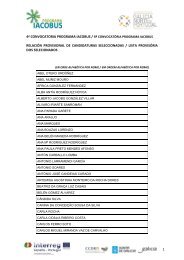1euaGiT
1euaGiT
1euaGiT
Create successful ePaper yourself
Turn your PDF publications into a flip-book with our unique Google optimized e-Paper software.
It is clear that young people are a core priority for policy makers at the EU level,<br />
particularly today given the impact of the economic crisis on their futures, but what role<br />
does youth work play in all of this Formal education might be considered to be the<br />
most obvious route to ensuring that young people have access to the best opportunities<br />
for learning, however young people have a great deal of time outside the classroom.<br />
How young people spend the majority of their time when they are not in education,<br />
training or at work can also influence the opportunities that are open to them. Indeed,<br />
there is big potential for non-formal and informal learning and youth work can play a<br />
key part of this. As Williamson stated at a recent conference on ‘The Current Crisis and<br />
Youth 39 ’, it is ‘not only human capital (qualifications), but also social capital (networks)<br />
and identity capital (self-presentation skills) that confers the best advantages on young<br />
people and the greatest protection against risk’. Youth work may take on many different<br />
guises, but the heart of youth work is that it focusses on the needs and interests of the<br />
young person in order to develop both human and social capital competences amongst<br />
young people. Human and social competences are important competences for example<br />
in work. A recent study by Eurofound finds that vulnerable NEETs often lack social,<br />
cultural and human capital 40 .<br />
Youth work invests in the lives of young people and whilst it is focussed on personal<br />
development and non-formal education, the value of the non-formal learning that takes<br />
place in youth work settings has the ability to improve both social well-being and<br />
employability. The transversal skills that are increasingly needed for personal, civic and<br />
professional routes from youth to adulthood can be achieved through youth work.<br />
Despite the clear policy agenda focussing on young people, and the evidence from some<br />
individual studies within a given national or youth work context, not enough is known<br />
about the landscape of youth work and most importantly, what the value is of the sector<br />
across the EU in terms of its outcomes and impacts. Whilst work has been carried out<br />
on various aspects of youth policy and youth work exploring themes such as the history<br />
of youth work and the impact of the crisis, there is a lack of comprehensive, comparable<br />
evidence on youth work across the EU as a whole.<br />
Therefore, the aim of this study is four-fold, to paint a picture of the landscape of youth<br />
work activities that take place across the EU, examine the value of the different forms of<br />
youth work, explore success stories which illustrate the experiences of those in the field<br />
and finally, identify the critical success factors that underpin effective youth work. F<br />
Navigating this report<br />
Chapter Two sets out the main facts relating to the key features which characterise<br />
youth work by identifying the kinds of actions that fall under youth work and who<br />
delivers those activities. It also looks at where youth work is headed by taking stock of<br />
the main trends in the sector during the last decade, examining the experiences within<br />
the sector.<br />
Chapter Three outlines the legal framework under which youth work falls in countries<br />
across the EU. It identifies what elements of youth work are regulated, highlighting the<br />
legal context of issues such as definitions, and funding, in addition to the requirements<br />
and responsibilities of those delivering activities.<br />
39<br />
Symposium ‘The Current Crisis and Youth – Impact and Ways Forward’", European<br />
Youth Centre, Strasbourg - 20-21 February 2013.<br />
40 NEETs: Young people not in employment, education, or training: Characteristics and<br />
costs and policy responses in Europe, European Foundation for the Improvement of<br />
Living and Working Conditions, 2012.<br />
43

















